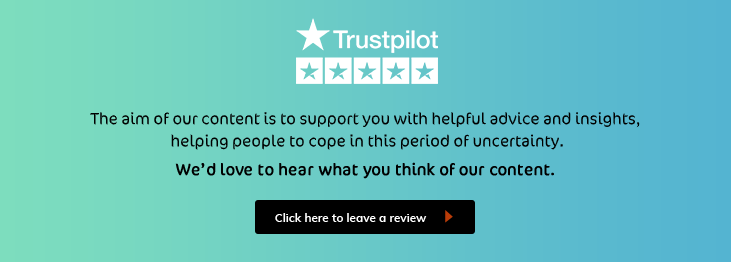How many times have you Googled the word Coronavirus in the last 24 hours? Or maybe you haven’t needed to, because it’s everywhere you turn. Cobra meetings, updates, statements, Tweets… The current socioeconomic climate can be overwhelming. It can seem impossible to strike a balance between staying informed to remain proactive and becoming anxious from over-absorbing the relentless stream of new information. Yes, Coronavirus is contagious, but so is panic.

Maybe you’d just calmed yourself down, and then you open Facebook, turn on the news or check your group chat, only to be bombarded by an onslaught of self-appointed virologists, sending you into a frenzy of uncertainty and doom. The truth is, as human beings we like certainty. And whilst we can never guarantee certainty in life, there are always things we can do to feel calmer about our circumstances.
Here are six tips to help you stay calm in this period of uncertainty:
- Learn the preventative measures and adhere to them.
We know, it’s an obvious one, but by adhering to the latest government guidelines, it’ll help you to feel in control and reduce any contamination anxiety you might be experiencing. Prevention is always better than cure, and by following the guidelines, you’re protecting yourself, those around you and the NHS.
- Stay in touch with friends and family, we’re more connected than ever.
In our world of modern technology, self-isolation doesn’t necessarily mean being alone. Ok, we should avoid physical interaction, social events and public places right now. But thanks to FaceTime, that doesn’t mean we can’t speak face-to-face with our loved ones through our phones. With such a focus on physical health symptoms, it can be easy to forget about mental health and the importance of checking in on friends and family. It might be an idea to ban the ‘c’ word in group chats, to prevent the spread of further panic. Either way, stay connected and remember you don’t have to shut off from the world because you’re at home.
- Limit screen time or try a ‘content diet’.
We know, we just suggested using your phone more to keep in touch with family and friends. But this is very different to using your phone to mindlessly scroll through social media to check the latest (probably wrong and most likely panic-triggering) information. Or using Google so much that you only have to search the letter ‘c’ before being presented with a list of suggestions that you’ve already searched more times than you’ve eaten this week. Whilst it’s important to stay informed, becoming obsessed with articles, conspiracy theories and contradicting stats isn’t helpful. Try following positive news sources such as Positive.News and Good News Network, try @Goodable on Twitter or @thehappynewspaper on Instagram. See it as a ‘content diet’… being mindful of what you ingest on a regular basis.
- Use self-isolation to be productive.
Whilst some of us might be nervous about a period of self-isolation, why not use the opportunity to catch up on some self-admin or face some of the jobs you’ve been procrastinating? Maybe you’ve been putting off clearing out the loft, finishing some gardening or doing a home workout. Gravitating towards doing something you love can also help you to relax, whether it’s reading, gaming, painting or baking. Even doing something trivial like a jigsaw puzzle can help you to feel productive and encourage feelings of positivity and achievement.
- Practise techniques such as mindfulness, or even just calm breathing.
Mindfulness is an amazing technique to help you overcome stress, as it’s essentially the human ability to be fully present, aware of where we are and what we’re doing and not overly reactive or overwhelmed by what’s going on around us. Whilst mindfulness is a technique that requires practise, “whenever you bring awareness to what you’re directly experiencing via your senses, or to your state of mind via your thoughts and emotions, you’re being mindful.”[1] This is incredibly helpful for stress and anxiety as it encourages us to be less reactive to situations beyond our control. Even calming your breathing is effective for relieving anxiety. Try slowing your breathing and focus on exhaling for a second or two longer than you inhale. Keep going for a couple of minutes and see how much calmer and in control you feel.
- Offer a helping hand to those who need it.
Pulling together as a community is essential in times like this, as we all need a dose of morale. Do you know someone who’s in a high-risk category? Maybe your elderly neighbour needs their dog walking, or a work colleague or family member in a high-risk category needs something from the shop (hopefully not toilet roll). To avoid face-to-face contact, could you put a note through a neighbour’s letterbox on your daily walk to let them know you’re here for them with a phone number? By helping to prevent the spread of the virus, you’re not only supporting yourself and others, you’re supporting the NHS. Plus, you’ll get a sense of reward from doing your bit for the community.
In times of uncertainty, it can be easy to surrender to panic and anxiety. But it’s important to take a step back and take a deep breath. Whilst many circumstances are beyond our control, there are always things we can do to feel calmer and more positive, which is bound to have a positive knock-on effect on those around us – that’s the kind of contagion we want!
As a final note from us here at Health Shield, our hearts and thoughts go out to all those affected at this time and we all stand together.
[1] https://www.mindful.org/meditation/mindfulness-getting-started/
This is a financial promotion.
Health Shield Friendly Society Limited is authorised by the Prudential Regulation Authority and regulated by the Financial Conduct Authority and the Prudential Regulation Authority.
.jpg)


